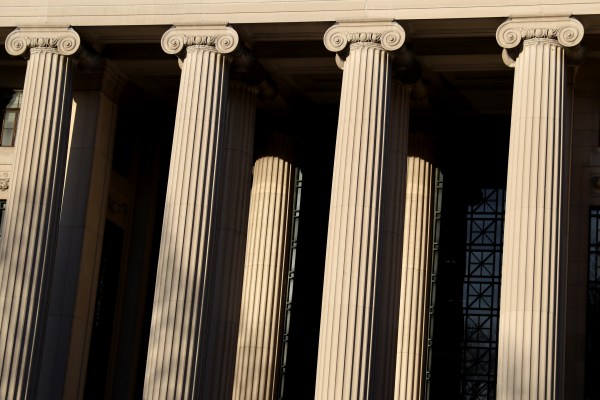Happy Monday! Citing a salmonella outbreak in 11 states, the CDC is reminding Americans not to eat “even a small amount” of raw cookie dough or cake batter.
We’ll take our chances, thank you very much.
Quick Hits: Today’s Top Stories
- OPEC+ countries, led by Saudi Arabia, announced Sunday they would slash oil output by more than 1 million barrels per day in an effort to stabilize prices despite weakening demand. The surprise move could inflame tensions between Washington and Riyadh, as the White House advised against the cuts. Oil futures jumped by as much as 8 percent on the news, with analysts projecting prices could return to nearly $100 a barrel.
- The Social Security Administration revised its estimate on Social Security insolvency last week, now projecting that—barring reforms—it will only be able to fully pay scheduled benefits until 2033 rather than 2034. The revision is largely due to a 3 percent drop in the agency’s gross domestic product and labor productivity projections.
- The personal consumption expenditures (PCE) price index—the Federal Reserve’s preferred measure of inflation—rose 5 percent year-over-year in February, the Bureau of Economic Analysis (BEA) reported Friday, down from a 5.3 percent annual increase in January. The core index, which excludes volatile food and energy prices and is considered a better predictor of future inflation, was up 4.6 percent year-over-year, a tick below January’s 4.7 percent annual rise. Consumer spending, meanwhile, increased 0.2 percent from January to February—but declined by 0.1 percent when adjusting for inflation.
- The Justice Department filed a lawsuit Thursday against Norfolk Southern over the February 3 train derailment that spilled toxic chemicals in East Palestine, Ohio, accusing the rail company of illegally polluting waterways. The suit seeks injunctive relief, cost recovery, and civil penalties to ensure the company pays for the entirety of the cleanup effort. A Norfolk Southern spokesman said the company remains focused on “cleaning up the site, assisting residents whose lives were impacted by the derailment, and investing in the future of East Palestine and the surrounding areas.”
- Delaware Superior Court Judge Eric Davis ruled Friday Dominion Voting Systems’ defamation case against Fox News would go to trial, rejecting the network’s claim that its anchors’ speech claiming the election had been stolen and Dominion was to blame was protected by the First Amendment and neutral reporting privilege. “Even if the neutral report privilege did apply, the evidence does not support that FNN conducted good-faith, disinterested reporting,” Davis wrote. “FNN’s failure to reveal extensive contradicting evidence from the public sphere and Dominion itself indicates its reporting was not disinterested.” Barring a settlement, the case will now go before a jury, with the trial set to begin April 17.
- About 25 people were injured and one killed when a bomb went off at a cafe in St. Petersburg on Sunday. It’s not yet clear who was behind the blast, or whether the man killed—Vladlen Tatarsky, a Russian military blogger and vocal proponent of the war in Ukraine—was deliberately targeted. Kyiv denied any involvement.
- At least 30 people were killed over the weekend as tornadoes and severe thunderstorms swept through the South and Midwest. Tennessee seems to have been the hardest hit—its statewide death toll rose to 15 on Sunday—but tornadoes reportedly touched down in at least seven states.
- Former Arkansas Gov. Asa Hutchinson announced Sunday he will run for the Republican presidential nomination in 2024, telling ABC News he is “convinced that people want leaders that appeal to the best of America.” The 72-year-old—who served as a congressman from 1997 to 2001 and headed the Drug Enforcement Administration from 2001 to 2003—said former President Donald Trump should drop out of the race following his indictment by the Manhattan district attorney last week.
- Democratic Sen. John Fetterman of Pennsylvania was discharged Friday from Walter Reed National Military Medical Center, where he’d been receiving treatment for clinical depression since February 15. Fetterman’s office said his depression had been declared “in remission” and that the freshman senator will return to Congress on April 17, after the Easter recess.
- Pope Francis was released from the hospital Saturday after undergoing treatment for bronchitis. Leaving the hospital, the 86-year-old pontiff joked with reporters that he’s “still alive” despite being admitted last week after having trouble breathing and receiving treatment with intravenous antibiotics.
- The LSU Tigers bested the Iowa Hawkeyes and Player of the Year Caitlin Clark 102-85 on Sunday, winning the NCAA Women’s Basketball title in the tournament’s all-time highest-scoring championship game. It’s the first such championship in LSU program history, but made LSU’s Kim Mulkey the first women’s basketball coach to win a national title with two different teams.
Strong Words and Cold Feet

At this point in the deliberations over raising the debt ceiling, House Speaker Kevin McCarthy and President Joe Biden sound less like senior elected officials negotiating to prevent global economic meltdown and more like two UFC fighters trash talking before a prizefight.
The United States hit its $31.4 trillion borrowing limit in January, and the Treasury Department has since been moving money around to keep the bills paid—so-called “extraordinary measures” expected to run out sometime this summer, depending on tax revenue. Most everyone agrees defaulting on our debts is not an acceptable outcome—Moody’s Analytics chief economist Mark Zandi has described the likely result as “financial Armageddon”—but lawmakers have so far made only incremental steps toward a solution. Republicans insist on pairing the debt limit increase with spending cuts, while Democrats demand a clean debt ceiling hike.
Biden and McCarthy traded rhetorical jabs over the stalled negotiations last week. The speaker sent the president a letter calling for a meetup—“I have no interest in brinksmanship,” he claimed—to which Biden responded with a letter of his own calling on Republicans to release their budget proposal first. The pair haven’t had a debt ceiling tête-à-tête since early February, and McCarthy seems eager to change that. “I would bring lunch to the White House—I would make it soft food if that’s what he wants,” McCarthy said Thursday in an apparent dig at Biden’s age. “It doesn’t matter. Whatever it takes to meet.”
White House Press Secretary Karine Jean-Pierre shot back on the president’s behalf, reiterating his insistence that Republicans raise the ceiling cleanly before negotiating budget cuts—and his call for the GOP conference to release its budget plan. “What we really need from Speaker McCarthy and from House Republicans is to see their budget,” she said. “Where’s the budget? They come up with excuses.” In short: Put up or shut up. Senate Majority Leader Chuck Schumer joined the fun, demanding Republicans get specific before expecting to talk. “You can’t sit down and discuss something if you don’t have a plan,” he said. “What are they going to do, discuss the weather?”
Nobody’s covering themselves in glory with this public sniping—but there has been some progress since we last updated you.
Republicans have been discussing amongst themselves what specific concessions they want to extract, and McCarthy included a few suggestions in his letter to Biden. In addition to the general call for cuts on non-defense discretionary spending, he suggested clawing back unspent COVID-19 relief money, beefing up work requirements for federal assistance programs, and reducing energy costs through measures like permitting reform. That last one in particular would appeal to moderate Democratic Sen. Joe Manchin, who indeed has bucked the party line by urging Biden to negotiate. “I think Kevin McCarthy has been most reasonable,” he said last week.
GOP members have also been workshopping plans to fulfill their vows to produce a balanced budget within 10 years—a gargantuan task that leadership has been emphasizing must be separate from the immediate debt ceiling fight. Rep. Andy Biggs of the House Freedom Caucus introduced more than 500 bills last week aimed at cutting $1 trillion in spending over the next decade, trimming everything from Supreme Court salaries to inland oil spill management. Budget Committee Chair Jodey Arrington, meanwhile, told reporters last month Republicans are putting together a budget proposal that would cut $130 billion from domestic agencies next year and cap spending growth in those areas at 1 percent annually for 10 years. McCarthy declared this proposal has “nothing to do” with the debt ceiling, and Arrington has agreed such a plan will likely need to wait.
With Biden insisting Republicans release a budget plan before he’ll come back to the table, McCarthy last week floated the possibility of forging ahead without negotiations, opting instead to pass a party-line bill raising the debt ceiling while tackling the priorities he laid out in his letter. “The conference is very close,” he said. “If the president doesn’t act, we will.”
But such a move, while perhaps important in any retroactive blame game, would almost assuredly go nowhere. Even if the House conference can agree on and pass a bill—and if it survives the Democratic-controlled Senate—Biden could veto a debt ceiling hike that comes with strings attached. “We can pass something all day long, and the White House is not going to sign it,” GOP Rep. Garret Graves of Louisiana told The Hill. “And so you know, in this case, we’ve got to have negotiation.”
Theoretically, lawmakers could also reach a short-term agreement to push their high-stakes deadline back a few months. But that would seemingly only delay the inevitable confrontation, not sidestep it.
So far, markets have been more worried about recent bank upheavals than the threat of debt-ceiling grandstanding pushing us over the brink. If that changes, of course, resulting carnage in 401(k)s could motivate lawmakers to get down to work—though for now, they’re focused on ensuring the other party would take the blame. “Any damage in Treasury markets and the bond market, to the economy, will fall at the feet of the president of the United States,” said GOP Rep. Byron Donalds, a member of the House Freedom Caucus. “He’s the one that started this entire saga saying he wanted no negotiations.”
As Congress dances on the debt ceiling precipice, some lawmakers are growing more nervous they’ll stumble over the edge. “I’ve never been more pessimistic about where we stand with the debt ceiling,” GOP Rep. Patrick McHenry, chair of the House Financial Services Committee, told Punchbowl News last Tuesday, adding he doesn’t see any path to a deal. He described himself as “very worried, very worried” and said there’s no real discussion happening. McCarthy himself has voiced similar concerns. “We’ve made no progress,” he told CNBC’s Squawk Box last week. “I’m always an optimist. I’m not now.” Rep. Chip Roy, meanwhile, has projected more confidence that Biden will give up and start talking. “The president’s going to negotiate,” he said. “That’s going to happen. The only question is when.”
Worth Your Time
- Russian forces arrested Wall Street Journal reporter Evan Gershkovich last week, charging him—the White House says baselessly—with espionage. In the Journal, Joe Parkinson and Drew Henshaw pen a profile of their colleague, a man now at the center of an international incident. “Mr. Gershkovich, 31 years old, is the American son of Soviet-born Jewish exiles who had settled in New Jersey. He fell in love with Russia—its language, the people he chatted with for hours in regional capitals, the punk bands he hung out with at Moscow dive bars,” they write. “Arriving in Russia, he joined the Moscow Times, an English-language paper that, though struggling, had long been a training ground for some of the most high-profile Russia correspondents. Mr. Gershkovich joined a team of young journalists who breathed life into the newsroom. ‘He loved Russia and he wanted to report from here,’ said Pjotr Sauer, a Moscow Times colleague now at the Guardian.” After the Russian invasion, now working for the Journal, “his adopted Moscow was starting to fill with fear and paranoia. ‘Reporting on Russia is now also a regular practice of watching people you know get locked away for years,’ he tweeted in July.”
- Palm Sunday marks the beginning of Holy Week, when Christians reflect on the days leading up to Jesus’ crucifixion and resurrection. In a piece for The Conversation, Holy Cross Professor Joanne Pierce highlights an often overlooked aspect of the story: the donkey Jesus rode into Jerusalem. “Gospel narratives left Christians throughout the centuries with two important images for Palm Sunday, the procession with palm branches and the donkey: one associated with triumphant victory, and the other with quiet humility,” she writes. “The image of the quiet, patient, and unassuming donkey has communicated humility in art and in practice. The palm also came to be a wider symbol. Early saints who had died as martyrs were shown holding a palm branch, signifying their victory over death. All of these images are rooted in the narrative of Palm Sunday, with its image of Jesus, the carpenter’s son, riding on an ordinary donkey, yet acclaimed for a moment as though he were a worldly king. A similar paradox is at the heart of Christian teachings: that although Jesus Christ willingly died on a criminal’s cross, doing so was a victory over sin and death.”
Romance Is Dead
Presented Without Comment
Also Presented Without Comment
Also Also Presented Without Comment
Toeing the Company Line
- Andrew had a blast answering your questions in March’s Monthly Mailbag (🔒). From St. Louis Cardinals baseball, to his time at Hillsdale College, to why the guitar is the best instrument to learn, click here to get to know one of The Dispatch’s two resident redheads.
- In the newsletters: Jonah argues Alex Jones and Gwyneth Paltrow are two sides of the same “brainless” coin, Haley covers (🔒) congressional Republicans’ response to the Trump indictment, Nick reminds (🔒) Trump supporters what they signed up for, and Chris urges (🔒) everyone to cool it with the 2024 prognostications. “We are so far from the election that we need to think of it in kind of geological terms,” he writes. “We’re still at the part where giant dragonflies are buzzing all over the place, and ferns rule the earth—and a long way away from the dawn of man.”
- On the podcasts: Sarah and David record a special Advisory Opinions at Harvard Law, Jonah gets fiery over the New York Young Republicans, and Steve interviews political reporter Jon Ward about his new book on faith and politics.
- On the site over the weekend: Sarah warns about the dangerous implications of the Trump indictment, Alec praises the revival of comedy series Party Down and explains the Silicon Valley Bank takeover, Ed Condon bemoans the look of the new Rolex, and Teddy Ray calls on college administrators to be the adults in the room.
- On the site today: David M. Drucker, reporting from Tallahassee, takes a deep dive into Florida Gov. Ron DeSantis’ prospective presidential run. Plus, Chris reflects on Trump’s indictment and the legacy of Grover Cleveland.
Let Us Know
Does one party have more of a responsibility to come to the table on debt ceiling negotiations than the other? Does any of this jockeying for position matter?








Please note that we at The Dispatch hold ourselves, our work, and our commenters to a higher standard than other places on the internet. We welcome comments that foster genuine debate or discussion—including comments critical of us or our work—but responses that include ad hominem attacks on fellow Dispatch members or are intended to stoke fear and anger may be moderated.
With your membership, you only have the ability to comment on The Morning Dispatch articles. Consider upgrading to join the conversation everywhere.